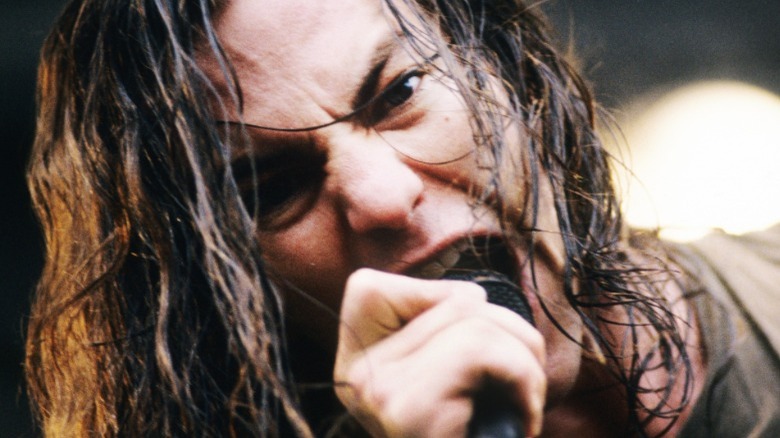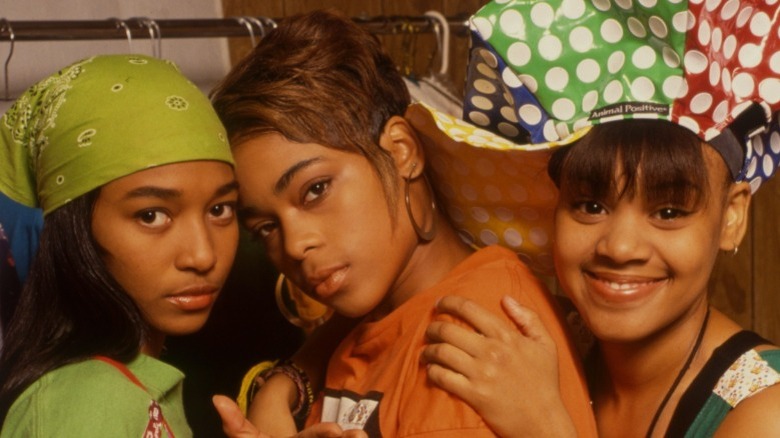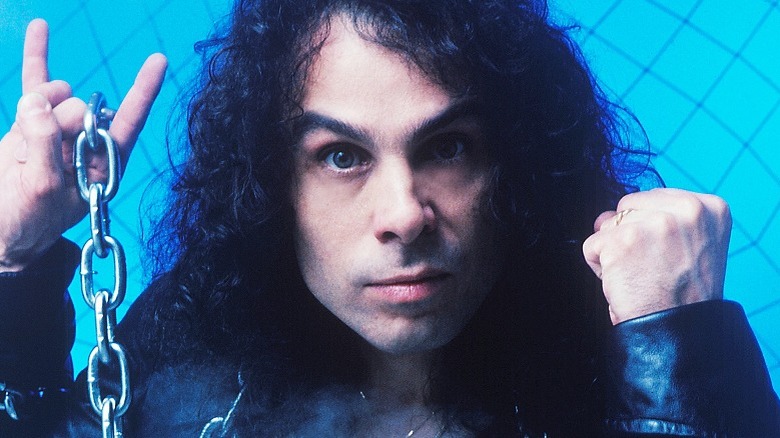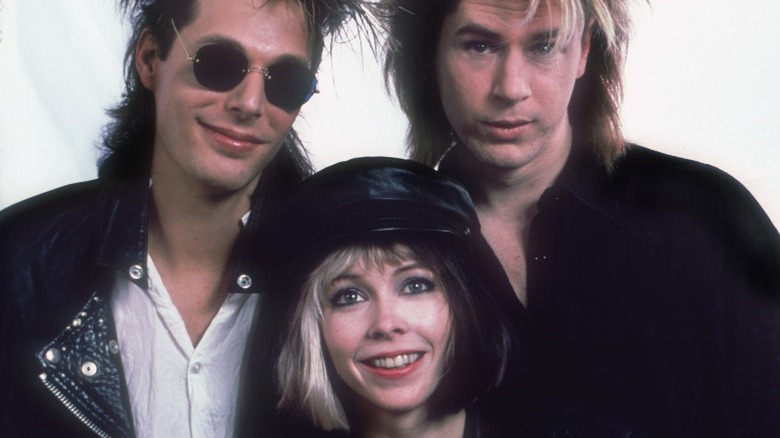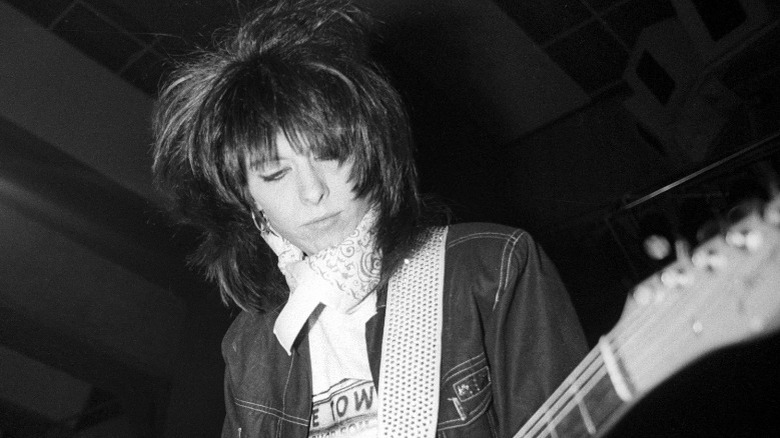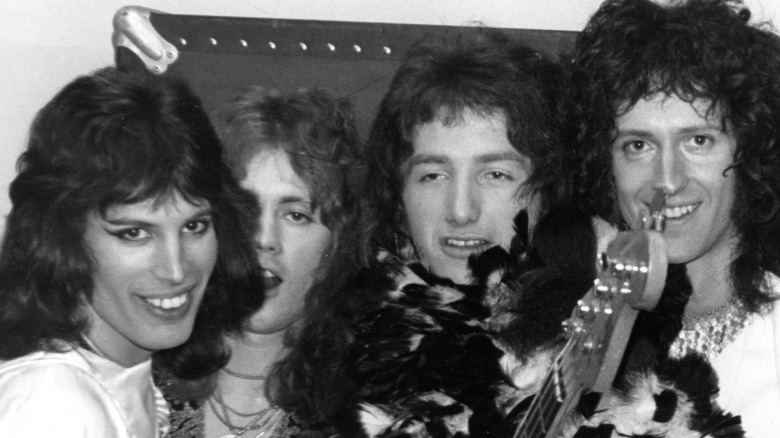Musicians Who Tried To Prevent Their Song From Becoming A Hit
Generally, musicians want their songs to become hits. After all, that's the whole point, right? Fame, money, adoring fans? You know, success? But artists, as it turns out, are a little more complicated than that –- even if the music industry isn't.
Ultimately a song is a work of art. Some exist completely free of expectations. Others are failed experiments, destined for the trash can like a novelist's crumpled-up piece of paper. And some are designed for a purpose, the musical equivalent of hotel room paintings. In all cases, the passion artists feel during the creative process can cool to arctic levels by the time a song is being released as a single to appease the masses, played to death on the radio, or adapted into a pandering music video.
And then there are the managers, producers, and label executives to contend with. Once they smell a hit, the desires of the artist often fall by the wayside as the management team becomes blinded by the dollar signs in their eyes. But for artists, a hit also comes with baggage — an unwanted image, increased fame, and pressure to perform it night after night. For better or worse, a hit song can define a musician's entire career. So, while artistic integrity is rarely a match for the sure promise of wealth, sometimes it's worth fighting for. From AFI to Led Zeppelin, here are the musicians who tried to prevent their songs from becoming hits.
Pearl Jam – Black
As grunge music was taking the world by storm in the early '90s, Pearl Jam was struggling with their sudden fame thanks to their song "Jeremy" becoming a massive hit with heavy rotation on MTV. According to Cameron Crowe in "Pearl Jam Twenty," the band's record label began pressuring them to release "Black" as the next single. At the time, all they wanted to do was dial it all back.
According to Louder, they were declining everything from interviews to Calvin Klein ads to stadium tours. Frontman Eddie Vedder took an especially firm stand with "Black," a slow emotional ballad about letting go that he wrote in 1990. "Some songs just aren't meant to be played between Hit No. 2 and Hit No. 3," he told Rolling Stone, adding, "Those fragile songs get crushed by the business. I don't want to be a part of it." Vedder forbade his label to release the song as a single, even going so far as to call radio stations to ensure it was not being played behind his back, as per Beyond the Beat.
But the world had other plans for the song. Per Rolling Stone, Vedder came across some hikers singing "Black" even after all of his attempts to keep it obscure. To their surprise, he walked out of the bushes and asked them to stop singing it. Nonetheless, it became one of Pearl Jam's biggest hits.
TLC – Creep
In the early '90s, the R&B trio TLC wrote a song called "Creep." Now viewed as an anthem for female empowerment, the song depicts a woman cheating on an unfaithful boyfriend as revenge. But group member Lisa "Left Eye" Lopes did not approve of the song's lyrics. "Is this the kind of message we should be sending out to people?" she said in an interview for Boxed Set, adding, "Instead of telling her to cheat back why don't we tell her to just leave?"
She openly opposed the song's release, claiming she would wear duct tape over her mouth in the music video to signal her disapproval. She even wrote an alternate version — deemed an "anti- 'Creep' rap" by her bandmates (per NME). She was out-voted, and "Creep" became TLC's first number one hit.
Group member Tionne "T-Boz" Watkins believes Lopes opposed the song due to her new boyfriend, professional football player Andre Rison. "They had one of those real touchy, jealous-like relationships so she didn't want him to think that she was cheating," she told NME. The pair had started dating in early 1993 and their relationship was tumultuous with darker undercurrents. According to the Los Angeles Times, Rison was arrested for physically abusing her in public, threatening a bystander who offered to help her, and firing a gun in the air in the fall of 1993. The couple remained together until Lopes' tragic death in a car accident in 2002.
If you or someone you know is dealing with domestic abuse, you can call the National Domestic Violence Hotline at 1−800−799−7233. You can also find more information, resources, and support at their website.
John Mayer – Daughters
When John Mayer's second album, "Heavier Things," was released in 2003, Mayer and his label had different ideas of what the third single should be. According to a clinic he hosted at his alma mater, Berklee College of Music, in 2008, Mayer pushed for "Come Back to Bed," but the label insisted that they had done the research and the acoustic ballad "Daughters" would perform well.
"When you put a song on the radio ... you're saying 'This is my racehorse, this is what you want to think of me as,'" he explained to the Berklee students. Mayer put his foot down, telling his label he did not want the song released as a single because it would pigeonhole him as a sensitive singer-songwriter. They reluctantly agreed –- but then the song leaked. Even as it became a huge hit, Mayer felt frustrated. "I did not want 'Daughters' to be a single," he said in his documentary "Someday I'll Fly." "The concept of that now being my thing frightened the hell out of me."
The song won two Grammy Awards in 2004. While accepting the award for Song of the Year, Mayer quipped, "It's still not the right choice of a single but this is nice to have." Per ET, he later broke his award in half and gave the second half to Alicia Keys, whose song "If I Ain't Got You" lost to "Daughters," saying, "I agree, Alicia. This should have been yours." The two reunited their halves 15 years later when Keys hosted the Grammys in 2019.
AFI – Miss Murder
Following the success of their 2003 album "Sing the Sorrow," rock group AFI found themselves signed to a major label and under tremendous pressure to create an even better follow-up. Songwriters Jade Puget and Davey Havok holed up in a basement in Los Angeles where they spent days struggling to write to no avail. According to guitarist Puget in an interview with Yahoo!, he eventually played a simple bassline on an acoustic guitar, and Havok responded by singing placeholder lyrics.
"We beat this song down," Havok told Kerrang! "In some abyss, I sang the melody of the chorus with a scratched lyric that went, 'Hey, Miss Murder, can I?' The label was like, 'That's it!' And I was like, 'Really!?'" He wanted to write better lyrics, but the label told him to keep it just as it was. Once it was finished, Puget and Havok felt it was passable, but they were not enamored with it.
When it came time to choose the songs that would become 2006's "Decemberunderground," the band wasn't sure "Miss Murder" should even be included. "I still don't think it's the best song on the record," Havok told Yahoo!, explaining that he had even suggested that they include a different song on the album in its place. In the end, the label pushed for it. "Miss Murder" went on to become AFI's biggest hit and launched them to mainstream fame. "We probably wouldn't be sitting here if they had listened to us," Havok admitted.
Radiohead – Creep
It's common knowledge that Radiohead hates their 1993 hit song, "Creep," as per Far Out Magazine, but it turns out the hatred goes all the way back to the song's beginning. Thom Yorke wrote "Creep" while at college in the late 1980s but never thought it would go anywhere after lackluster response to their first EP released in Britain, as per the New York Times. The band's producers, however, fell in love with the song and insisted they record it.
While playing it in the studio, lead guitarist Jonny Greenwood, in his distaste for the song's mellow intro, aggressively jabbed at his guitar several times just before the chorus. "I didn't like it," Greenwood told Rolling Stone. "It stayed quiet. So, I hit the guitar hard –- really hard." The handful of loud clipped notes that resulted are now iconic. In fact, the band lovingly refer to them as "The Noise." "That's the sound of Jonny trying to [mess up] the song up," guitarist Ed O'Brien told Rolling Stone. When the take ended, everyone clapped enthusiastically. It was Greenwood's attempt at sabotage, but it accidentally made the song a great success.
Dio – Rainbow in the Dark
Ronnie James Dio originally hailed from the band Black Sabbath, whose sludgy doom-laden grooves are credited with inspiring heavy metal (via the BBC). So, when his new band, Dio, wrote a song that tended toward the upbeat end of the spectrum in 1983, he knew he had to do something to stop it.
With its soaring chorus and downright jolly synth part, "Rainbow in the Dark" definitely rocks — but it's very cheerful. "When it was finished, I announced to everyone that I was going to take a razor blade and cut the tape up," Dio said in an interview (via YouTube). When he reached for the razor blade (which he joked to VH1 was the equivalent of the delete button in the 1980s), everyone in the studio begged him not to kill the song.
Dio explained it was a song he really disliked (via YouTube). "For me, it was too poppy for this album." While he never admitted to liking the song, he was glad his band talked him out of destroying it. It became a huge hit for Dio, and they performed it at every show following its release.
Nicki Minaj – Your Love
While Nicki Minaj is a superstar now, in early 2010 she was not yet a household name. Her debut album, "Pink Friday," was not due out until November (via MTV), and its first single, "Massive Attack," was scheduled for a March release. So, imagine her surprise when her old scrapped song, "Your Love," somehow became a hit in January.
As OkayPlayer details, Minaj had recorded the song in 2008, leaving it on the cutting room floor. But someone had stolen the demo from the studio and leaked it. When she heard that the song was out, she was in disbelief. "I went and listened to it and was really upset," she told MTV. "It wasn't mixed, it wasn't finished, it wasn't anything — I wasn't gonna use it at all. But then radio started playing it." "Your Love" quickly rose to number one (via Billboard).
She had no choice but to record an official version, which she released as a single in June 2010. It was added to "Pink Friday" and remains one of her top songs, although she told the 2020 Pollstar Live Conference that she hates the song and wishes she had never recorded it. In fact, when it first leaked she thought her career was over before it began. "I cried because I was mortified," she told Billboard (via Digital Spy). "I was humiliated and remember telling Drake, 'This is going to ruin my career.'"
Berlin – Take My Breath Away
In the mid-1980s, per The Guardian, producer Jerry Bruckheimer asked Italian songwriter Giorgio Moroder to write a slow romantic song for his new movie, "Top Gun." A demo of "Take My Breath Away" in hand, he searched for a singer. He thought of Berlin, the still relatively unheard-of California new wave band.
Berlin had previously hired Moroder to help write their song "No More Words." So, when he approached the band's lead vocalist, Terri Nunn, about singing "Take My Breath Away," she was thrilled. He loved her version and submitted the song to the soundtrack. But not all of Berlin was pleased with the arrangement. "None of us had ever heard it," songwriter and bassist John Crawford told The Shortlisted. "None of us had anything to do with it. Nobody played on it. No one wrote it."
Nonetheless, it topped the charts in 1986. But when the tour came around, Crawford did not want to perform the song even though it was their biggest hit, as per News.com.au. "Looking back, all we needed was a break," Nunn told News.com.au. "But we were kids and the record label just wants you to work so they can get their money as long as the gravy train lasts." Berlin broke up in 1987, just one year after the song's release.
The Pretenders – Brass in Pocket
In the late 1970s, producer Chris Thomas went to London to see a band called The Pretenders play, according to Jon Kutner and Spencer Leigh in their book, "1,000 U.K. #1 Hits." He was blown away by a cheeky little song called "Brass in Pocket" and went backstage to tell the singer it could be a big hit. To his surprise, Chrissie Hynde did not like the song. But, as the group's producer, he convinced her to record it in late 1979.
According to American Songwriter, "Brass in Pocket" came about when Hynde captured a riff played by guitarist James Honeyman-Scott on a tape recorder and sang lyrics over it. But she didn't like her voice on the studio recording and told Thomas (per Louder), "This goes out over my dead body." He somehow convinced her to release it and, as he predicted, it became a huge hit.
"I hated it!" Hynde told Creem Magazine in 1981 (via Songfacts). "I was honestly very disappointed it was such a big hit — I was embarrassed by it." In addition to hating her vocals, she felt like it was trying to be a Motown song but failing. She also thought her cocky lyrics were "a big lie" (via American Songwriter). But the world did not agree. "I remember walking around Oxford Circus hearing it blasting out of peoples' radios," she told Louder. "I was mortified!"
Queen – Don't Stop Me Now
In 1978, Queen was taking over the world -– but so was the devastating new illness, AIDS. According to Benoit Clerc in his book, "Queen: The Story Behind Every Track," Queen frontman Freddie Mercury was becoming increasingly reckless with his health, using drugs and being promiscuous. His behavior was creating a rift between him and the rest of the band.
So, when Mercury wanted to release "Don't Stop Me Now," a song commemorating his rampant hedonism, guitarist Brian May was less than enthused –- even if it was a total jam. "Yes, it's a great party song," May told Mark Blake in his book "Freddie Mercury: A Kind of Magic." "But it related to a detrimental time in Freddie's life and we were all rather worried about him."
Despite the rest of the band's misgivings, "Don't Stop Me Now" was released in 1979. People responded to the joyous energy of the song, and it became an instant hit. "They don't know the darkness behind it," drummer Roger Taylor said in "Queen." Later, May told Guitar Player Magazine (via Yahoo News), "I found it a little bit too flippant in view of the danger of AIDS." Mercury was diagnosed with AIDS in 1987, but he kept it a secret for years, as per Smooth Radio, breaking the news 24 hours before his death in 1991.
Sia – Titanium, Wild Ones
After releasing five solo albums, Australian singer Sia decided she hated fame and performing but loved writing songs, as per NPR. So, in 2010, she became a "behind-the-scenes" songwriter, crafting pop songs for other artists to sing. It was okay if the songs became hits, so long as they didn't become hits for her. But the plan backfired.
In 2011, DJ David Guetta released the explosive pop song "Titanium" with Sia's vocals on it thinking he was doing her a favor. But she was less than thrilled, because she had just retired, she told NPR. She had written the song for Alicia Keys, but she passed on it. It then went to Mary J. Blige, but Guetta pulled her vocals off at the last minute. Sia's vocals were just intended to sell the demo.
Oddly enough, it happened again a few months later with "Wild Ones," a song Sia had written for Flo Rida. As Billboard details, the final version included her vocals –- which Sia was willing to allow, so long as they didn't credit her as a feature. But they did. "I was angry because we had already had this discussion," she said. "[My manager] said to me, 'I don't think I really believed you that you didn't want to be credited or get the recognition you deserve.'" As a result, Sia became famous despite her best efforts not to.
Led Zeppelin – Stairway to Heaven
"Stairway to Heaven" is already a massive hit — in fact, it is one of the 500 greatest songs of all time (per Rolling Stone) and one of the VH1's 100 greatest rock songs. So, there's really not much Led Zeppelin can do to prevent its success at this point. Luckily, most of the band members wouldn't want to. According to a 1975 interview with Rolling Stone, guitarist Jimmy Page considers it a defining song for the band and something of lasting quality.
While he thinks the music is great, Plant's not a fan of his contribution to the song. "Lyrically, now, and even vocally, I go, 'I'm not sure about that,'" Plant told Ultimate Classic Rock Nights (via Loudwire). You get the sense that if he never had to hear the song again, he might not mind.
One day, while driving to a concert in Oregon in 2002, he got his chance to make that happen. The radio station he happened to be listening to, KBOO in Portland, was seeking sponsorships, as per NPR (via Far Out Magazine). In exchange for donations, they vowed to never play "Stairway to Heaven" again. Plant immediately pulled over and pledged $10,000. Perhaps there's still time to change the road you're on after all.

